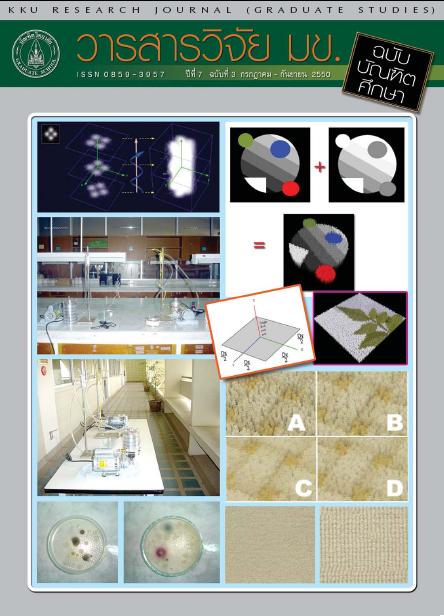The Development of Emotional Quotient by using Yonisomanasikarn Training Program of Juvenile Delinquents in Children And Youth Center Area 4, Khon Kaen Province
Keywords:
Emotional quotient(ความฉลาดทางอารมณ์), Yonisomanasikarn(โยนิโสมนสิการ)Abstract
การวิจัยครั้งนี้เป็นการวิจัยกึ่งทดลอง (Quasi – Experimental Research) มีวัตถุประสงค์เพื่อพัฒนาความฉลาดทางอารมณ์โดยใช้โปรแกรมฝึกการคิดแบบโยนิโสมนสิการของเยาวชนในศูนย์ฝึกและอบรมเด็กและเยาวชน เขต 4 จังหวัดขอนแก่น และเปรียบเทียบความฉลาดทางอารมณ์ของเยาวชนที่เข้าร่วมโปรแกรมและเยาวชนที่ไม่ได้เข้าร่วมโปรแกรมฝึกการคิดแบบโยนิโสมนสิการ กลุ่มตัวอย่างคือ เยาวชนชายอายุตั้งแต่ 14-17 ปี จำนวน 20 คน แบ่งเป็นกลุ่มทดลองและกลุ่มควบคุม กลุ่มละ 10 คน กลุ่มทดลองเข้าร่วมโปรแกรมจำนวน 10 ครั้ง ครั้งละ 40-50 นาที เครื่องมือที่ใช้ในการวิจัย คือ แบบประเมินความฉลาดทางอารมณ์ มีค่าความเชื่อมั่นเท่ากับ .83 แบบบันทึกการสังเกตพฤติกรรม แบบประเมินกิจกรรม และโปรแกรมฝึกการคิดแบบโยนิโสมนสิการเพื่อพัฒนาความฉลาดทางอารมณ์ โดยกลุ่มตัวอย่างได้รับการทดสอบก่อนและหลังการทดลองด้วยแบบประเมินความฉลาดทางอารมณ์ และนำคะแนนที่ได้มาวิเคราะห์ข้อมูล ทดสอบความแตกต่างของคะแนนความฉลาดทางอารมณ์ก่อนและหลังการทดลองของกลุ่มทดลอง โดยใช้สถิติทดสอบ The Wilcoxon’s Matched-Pairs Signed-Ranks Test และทดสอบความแตกต่างของคะแนนความฉลาดทางอารมณ์หลังการทดลองระหว่างกลุ่มทดลองและกลุ่มควบคุมโดยใช้สถิติทดสอบ The Mann-Whitney U-test ผลการวิจัยพบว่า เยาวชนที่เข้าร่วมโปรแกรมฝึกการคิดแบบโยนิโสมนสิการเพื่อพัฒนาความฉลาดทางอารมณ์ หลังการทดลองมีคะแนนความฉลาดทางอารมณ์สูงกว่าก่อนการทดลอง และสูงกว่ากลุ่มควบคุม อย่างมีนัยสำคัญทางสถิติที่ระดับ .05This research was a Quasi-Experimental Research. The objectives of this study were: 1) to develop the Emotional Quotient by using Yonisomanasikarn Training Program of the youth in Children and Youth Center Area 4, Khon Kaen Province, and 2) to compare Emotional Quotient between the youth participated in Yonisomanasikarn Training Program and the youth who didnût participate in Yonisomanasikarn Training Program. The sample were 20 male youths with their ages between 14-17 years old, dividing into 2 groups: the experimental group and control group, 10 persons each group. Experimental group - was treated for 10 sessions, 40-50 minutes for each session. The instruments included: 1) The Emotional Quotient Assessment Scale with reliability coefficient of .83, 2) The Behavioral Observation Record Scale, 3) The Activity Assessment Scale, 4) The Yonisomanasikarn Training Program for developing Emotional Quotient. The sample were administered the pre-test and post-test by the Emotional Quotient Scale. Tested the differences of scores of Emotional Quotient before and after the experiment of the experimental group by using the Wilcoxon Signed Rank Test, and tested the differences of scores of Emotional Quotient after the experiment between the experimental group and control group by using The Mann-Whitney U-test. The research findings found that: 1) the youth participating in Yonisomanasikarn Training Program for developing Emotional Quotient after the experiment, showed their Emotional Quotient Scores from the post-test higher than pre-test, and 2) the experimental group showed their scores from the Emotional Quotient Scale higher than the control group at the .05 significant level.



